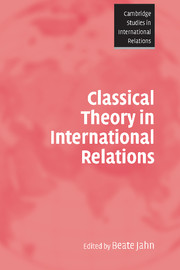Book contents
- Frontmatter
- Contents
- Notes on contributors
- Acknowledgements
- 1 Classical theory and international relations in context
- Part I Intellectual contexts
- 2 Pericles, realism and the normative conditions of deliberate action
- 3 Immanuel Kant and the democratic peace
- 4 ‘One powerful and enlightened nation’: Kant and the quest for a global rule of law
- 5 Rousseau and Saint-Pierre's peace project: a critique of ‘history of international relations theory’
- Part II Political contexts
- Part III Lineages
- Index
- CAMBRIDGE STUDIES IN INTERNATIONAL RELATIONS
4 - ‘One powerful and enlightened nation’: Kant and the quest for a global rule of law
Published online by Cambridge University Press: 22 September 2009
- Frontmatter
- Contents
- Notes on contributors
- Acknowledgements
- 1 Classical theory and international relations in context
- Part I Intellectual contexts
- 2 Pericles, realism and the normative conditions of deliberate action
- 3 Immanuel Kant and the democratic peace
- 4 ‘One powerful and enlightened nation’: Kant and the quest for a global rule of law
- 5 Rousseau and Saint-Pierre's peace project: a critique of ‘history of international relations theory’
- Part II Political contexts
- Part III Lineages
- Index
- CAMBRIDGE STUDIES IN INTERNATIONAL RELATIONS
Summary
‘[T]he possession of power inevitably corrupts the free use of reason.’
– KantIn recent years ‘classical’ international law as a body of rules, norms and conventions has been assailed by scholars and questioned by world leaders. In particular, the rules concerning sovereign equality and effective power (or control over territory) as the most salient criteria for membership in international society have been challenged. Such rules are problematic because they are supposed to be applied neutrally with regard to regime types, thus ignoring the significant differences between liberal democratic and non-liberal/authoritarian regimes. Classical international law (or right) is indifferent to internal political institutions and thus countenances governments that wield power in a lawless (or rights abusing) fashion. For generations of liberal philosophers and lawyers, this formulation of international law is problematic and contradictory. From Immanuel Kant to the present, critics of classical international law have put forward versions of the following argument: There can be no truly effective global rule of law among states if international law permanently acquiesces to the absence of the rule of law within states.
This chapter examines the use of Kant's international legal arguments by contemporary scholars. Kant provides genuine inspiration for a critique of classical international law. He is a harsh detractor of traditional international norms and practices among states that simply authorize the illegitimate use of political power. However, I contend that contemporary scholars put forward a view of legal relationships among states that Kant was careful to avoid.
- Type
- Chapter
- Information
- Classical Theory in International Relations , pp. 74 - 95Publisher: Cambridge University PressPrint publication year: 2006
- 5
- Cited by

